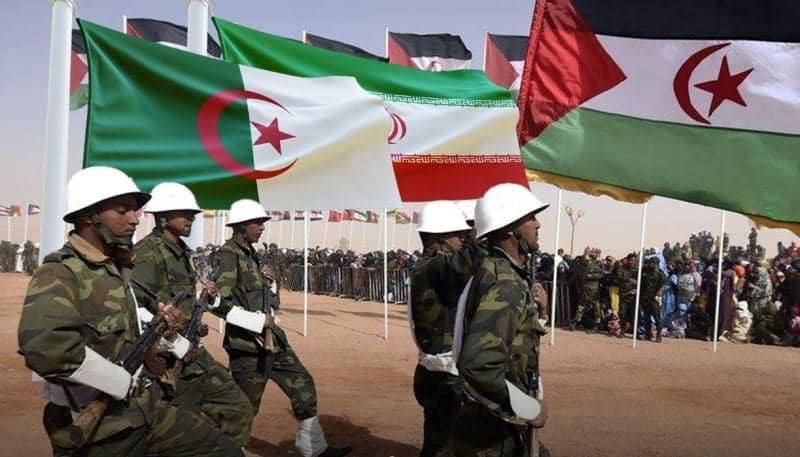Capture of Polisario Militants in Aleppo Shows Extent of Iran’s Presence in Sahara

Iran’s military training of Polisario militants in Syria, exposed after their capture in Aleppo, intensifies calls for designating the separatist group as a terrorist organization.
Recent developments in Syria have revealed the capture of approximately 30 Polisario Front militants by Syrian opposition forces in Aleppo, highlighting growing concerns about Iran’s expanding influence in North Africa and its role in training separatist groups.
According to security sources speaking to multiple news outlets, the militants were arrested four days ago in Aleppo after being abandoned by Al-Assad regime forces during recent clashes.
Former Iraqi deputy Omar Abdul Sattar first brought attention to the incident, stating that the militants were found in a camp in rural Aleppo after being transported there by Algeria with Iranian support.
“They were under the supervision of Iranian military advisor Borhashmi, who was killed, and were receiving military training before their planned return to Tindouf to use these experiences in operations against Moroccan territories,” he noted.
“After completing special training under Iranian military advisors in the Tindouf camps, they entered Syria several months ago using Algerian passports,” a Moroccan security source told a local news website. Their mission reportedly involved supporting Bashar Al-Assad’s regime against potential opposition offensives.
Algerian diplomatic efforts for release
The incident has prompted immediate diplomatic action from Algeria. Foreign Minister Ahmed Attaf discussed the matter during a phone call with his Syrian counterpart on Thursday.
Algeria’s Ambassador to Syria, Kamel Bouchama, attempted to downplay the situation by emphasizing that “500 Algerians live in Aleppo,” without directly addressing the presence of Polisario militants.
Diplomatic sources indicate that Algeria is actively seeking Turkish mediation for the militants’ release, given Turkey’s influence over Syrian opposition groups.
The Algerian government has also established a crisis cell to manage the situation, providing emergency contact numbers for its citizens in Syria.
Iranian connection and military training
Further details about Iran’s involvement emerged through Fahad Almasri, head of Syria’s National Salvation Front, who revealed in an article published in the Israeli news outlet Yedioth Ahronoth that “Iran’s Revolutionary Guard has sent approximately 200 Polisario elements, supported by Algeria and Iran, to southern Syria.”
These forces were specifically stationed at the Thaala military airport, the air defense battalion in Sweida, and the 90th Brigade, located just 20 kilometers from the Golan Heights.
Almasri disclosed that Iran has been training Polisario elements at Syrian army locations in rural Daraa over the past three years.
He questioned Algeria’s motives in supporting the Polisario in its hostility toward Morocco while maintaining strong support for the Al-Assad regime in Syria and aligning itself with the Islamic Republic of Iran against the Syrian people.
The Syrian political activist warned that the Polisario militia now poses a threat to Algeria’s own national security, especially since it has begun taking direct orders from Iranian leadership.
The training operation is part of Iran’s broader military presence in Syria, where Tehran maintains more than 60 militias spread across over 520 locations.
Recent tactical changes in the region have seen Hezbollah evacuating numerous positions in southern Syria opposite the Golan Heights, with these positions being filled by Popular Mobilization Forces militia members, many of whom have been naturalized by the Al-Assad regime.
The Syrian opposition figure emphasized that Iran’s deployment of Polisario elements in Syria reinforces international demands to designate this organization as a terrorist group.
He stressed that “the Polisario Front not only threatens Morocco’s territorial integrity but also poses a threat to the regional security system, which requires serious action to eliminate this organization and hold accountable all those who support and assist it.”
Historical context and implications
This is not the first time the Polisario Front has been involved in regional conflicts. In 2011, the group’s militants fought alongside Gaddafi’s forces in Libya, though their support failed to prevent the regime’s eventual collapse. Syria has maintained recognition of the separatist group’s self-proclaimed “SADR” since 1980.
The incident recalls Morocco’s 2018 decision to sever diplomatic relations with Iran over Tehran’s role in arming and training Polisario militants through Hezbollah. Diplomatic sources have consistently pointed to Algeria’s role as a facilitator in this alliance, providing necessary operational support between the separatist group, Hezbollah, and Iran.
These developments have renewed calls for designating the Polisario Front as a terrorist organization, particularly given its documented connections with Iran and its militant activities. With the return of Donald Trump to the White House in 2025, who previously recognized Morocco’s sovereignty over the Sahara, such a designation could become more likely.
The presence of Polisario militants in Syria underscores Iran’s broader strategy to expand its influence in the Maghreb region. Security analysts suggest that by strengthening the Polisario militarily, Tehran aims to create a new zone of instability, potentially threatening regional security beyond just Morocco’s territorial integrity.

